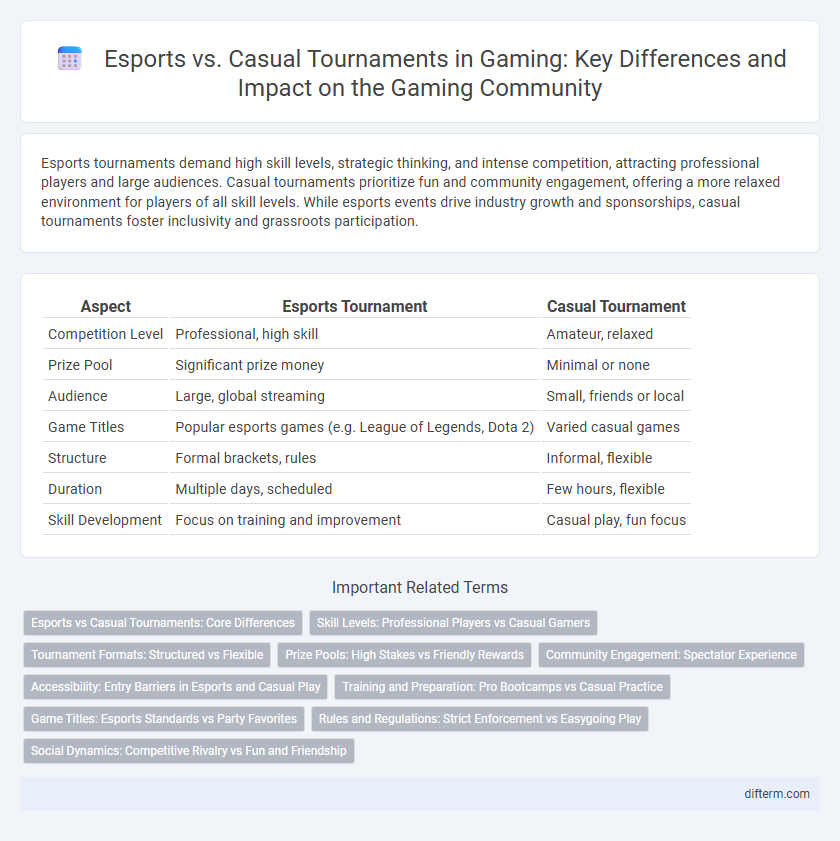Esports tournaments demand high skill levels, strategic thinking, and intense competition, attracting professional players and large audiences. Casual tournaments prioritize fun and community engagement, offering a more relaxed environment for players of all skill levels. While esports events drive industry growth and sponsorships, casual tournaments foster inclusivity and grassroots participation.
Table of Comparison
| Aspect | Esports Tournament | Casual Tournament |
|---|---|---|
| Competition Level | Professional, high skill | Amateur, relaxed |
| Prize Pool | Significant prize money | Minimal or none |
| Audience | Large, global streaming | Small, friends or local |
| Game Titles | Popular esports games (e.g. League of Legends, Dota 2) | Varied casual games |
| Structure | Formal brackets, rules | Informal, flexible |
| Duration | Multiple days, scheduled | Few hours, flexible |
| Skill Development | Focus on training and improvement | Casual play, fun focus |
Esports vs Casual Tournaments: Core Differences
Esports tournaments feature professional players competing in highly structured formats with significant cash prizes and global audiences, emphasizing skill, strategy, and teamwork. Casual tournaments are more inclusive, prioritizing fun and social interaction over intense competition, often hosting local or community players in informal settings. The core differences lie in the scale, professionalism, and stakes involved, with esports demanding rigorous training and offering career opportunities, while casual events focus on accessibility and enjoyment.
Skill Levels: Professional Players vs Casual Gamers
Esports tournaments showcase professional players with highly refined skills, extensive practice, and strategic gameplay developed through rigorous training and competition. Casual gamers in tournaments typically exhibit diverse skill levels, focusing more on enjoyment and social interaction rather than competitive excellence. The contrast in skill levels highlights the intense precision and teamwork required in esports compared to the varied, often recreational nature of casual gaming events.
Tournament Formats: Structured vs Flexible
Esports tournaments typically feature structured formats with predefined rules, brackets, and schedules to ensure competitive integrity and spectator engagement. Casual tournaments offer flexible formats that accommodate varying skill levels, allow spontaneous rule changes, and promote social interaction among participants. Choosing between these formats impacts player experience, event organization, and the overall atmosphere of the competition.
Prize Pools: High Stakes vs Friendly Rewards
Esports tournaments often feature multimillion-dollar prize pools funded by sponsors, game developers, and streaming revenue, attracting top-tier professional players and intense competition. Casual tournaments typically offer modest rewards or in-game prizes, emphasizing community participation and enjoyment over financial gain. The stark contrast in prize pools highlights the high stakes in esports versus the friendly rewards that foster inclusivity in casual gaming events.
Community Engagement: Spectator Experience
Esports tournaments deliver highly immersive spectator experiences through professional commentary, live statistics, and interactive platforms that boost community engagement. Casual tournaments often foster a more intimate atmosphere, encouraging grassroots participation and direct fan interaction with players. Both formats enhance community connection but differ in scale and technological integration, shaping unique fan experiences.
Accessibility: Entry Barriers in Esports and Casual Play
Esports tournaments often require high skill levels, specialized equipment, and significant time investment, creating notable entry barriers that restrict accessibility for many players. Casual gaming events prioritize inclusivity with simpler rules, lower skill demands, and minimal equipment needs, enabling broader participation regardless of player experience. Accessibility differences impact community growth, as casual tournaments foster larger, more diverse player bases while esports remain competitive and niche.
Training and Preparation: Pro Bootcamps vs Casual Practice
Professional esports tournaments demand rigorous training regimens involving intensive bootcamps that focus on team strategies, communication drills, and mental conditioning to optimize peak performance. Casual tournaments involve more flexible practice schedules, often emphasizing individual skills and enjoyment rather than structured team dynamics. The contrast in preparation intensity directly influences gameplay quality, with pro bootcamps fostering higher coordination and adaptability in competitive environments.
Game Titles: Esports Standards vs Party Favorites
Esports tournaments prominently feature game titles like League of Legends, Dota 2, and Counter-Strike: Global Offensive, known for their competitive balance and skill ceiling. In contrast, casual or party tournaments often highlight games such as Mario Kart, Super Smash Bros., and Among Us, which emphasize accessibility and social interaction. The distinction in game titles reflects differing player engagement styles and audience expectations within the gaming community.
Rules and Regulations: Strict Enforcement vs Easygoing Play
Esports tournaments enforce strict rules and regulations to ensure fair competition, including standardized game settings, player conduct policies, and anti-cheating measures monitored by officials. Casual gaming tournaments adopt an easygoing approach, often allowing flexible rules, variable game modes, and minimal oversight to encourage fun and inclusive participation. The contrast in enforcement levels directly impacts the competitive integrity and overall atmosphere of the gaming event.
Social Dynamics: Competitive Rivalry vs Fun and Friendship
Esports tournaments cultivate intense competitive rivalry, driving players to refine skills and strategize for victory, fostering a high-stakes environment with passionate spectators. Casual tournaments emphasize fun and friendship, encouraging social interaction and community bonding without the pressure of professional ranking. These contrasting social dynamics shape distinct player experiences, influencing motivation, teamwork, and the overall atmosphere of gaming events.
esports vs casual tournament Infographic

 difterm.com
difterm.com